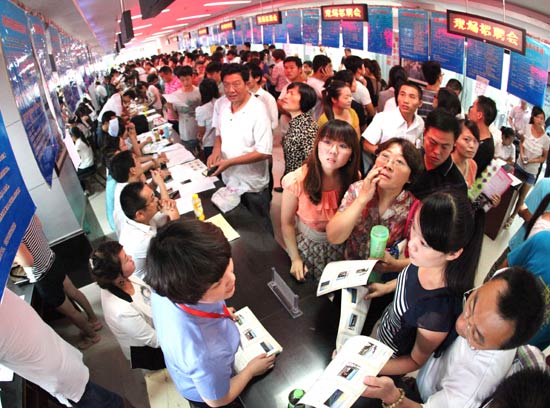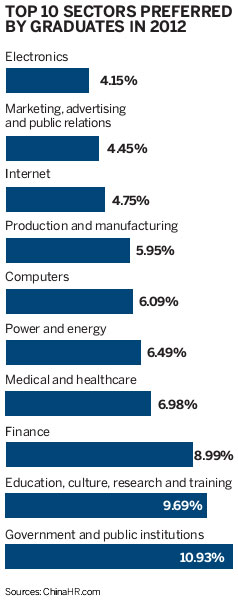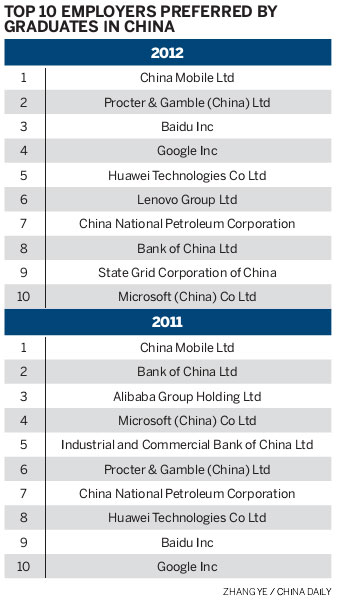
Foreign firms see slight growth in popularity compared to 2010
State-owned enterprises are still the employer of choice for the majority of Chinese employees, although working for a foreign company has grown slightly in popularity, according to a local employment survey.
In its annual list of the 50 best employers in China, Chinahr.com, the Chinese subsidiary of Monster Worldwide, listed 18 foreign companies, including P&G (China) Ltd and Google Inc.
The rest are Chinese companies, most of which are SOEs.
 |
|
Jobseekers at a job fair for college graduates in Bozhou, Anhui province, on Aug 18, 2012. A study found that working for a State-owned enterprise or local privately owned companies is becoming increasingly attractive, a major shift in the country’s graduate jobs market. [Photo / China Daily] |
The number of foreign companies on the list had dropped to just three in 2010, after having accounted for more than half of the top 50 in 2007.
"Redundancies and layoffs by foreign companies in 2008 had a negative effect on their popularity, and their approval rating dropped badly in 2010, because of the financial crisis," said Liu Xiangyang, senior human resource consultant at Chinahr.com.
Working for an SOE has gained in popularity over the past decade, because of their ability to offer stable employment and attractive salaries, said Liu.
However, the popularity of foreign companies has recovered, with 18 companies now listed in the 50-strong league table, as the financial reputations of international companies recover from 2008.
Liu said: "The recovery is also partly due to the fact that more of the post-1990 generation of students on the job market today value creativity in the workplace and a freedom to express themselves, which can be more common in foreign corporate culture."
He added that if the Chinese economy continues to perform at its current level, he expected the popularity of working for a foreign company to continue to grow next year.
 |
 |
Commenting on the list, Xu Jiangling, a 23-year old graduate from Beijing Language and Culture University, said she valued working for a company which could offer "a challenge rather than stability" more than anything.
He said that he gave up a job at a State-owned bank in his hometown, and starts in September with the international accounting giant PwC.
"The British company's culture gives me the right feeling," he added.
Xu's new employer joined the list for the first time this year in 30th place.
 |
The report shows that government departments and public institutions were the top choice of graduates for the first time, with 10.93 percent of the 40,000 respondents choosing a job in that sector before anything else.
"Young employees don't care about the relatively low salary of these kinds of jobs — they want less work pressure and more free time," added Tang Wen, Chinahr.com's senior public relationship manager.
The need to take a civil service entry exam didn't seem to be a deterrent either.
In 2009, the number of applicants for the State-level civil service exam hit 1 million for the first time; that increased to 1.47 million in 2010; last year it dropped only slightly, to 1.41 million, while only 16,207 applicants were recruited.
The report also showed that young employees appear to prefer government jobs that challenge them, Liu said.
"'Post-1990' employees have much more choice than many did in the past," he said, adding that many come from wealthier families, giving them the option to be choosy about where they work.
The report also said that only 48 percent of college graduates started working for an employer immediately after graduation, the lowest level in a decade.
Some 30 percent started further study, went abroad, started their own business, or still hadn't decided what they wanted to do.
"Many of their families can afford for them not to work; but some graduates still want to understand themselves better, before starting to plan their careers," Liu said.
Contact the writer at [email protected]
Chinese new grads' employment
More new grads opt for State firms
Corporate competitiveness
College grads struggle to find jobs
Chinese grads prefer to work in smaller cities
Fewer grads taking test for govt jobs
Two SOEs top list of dream employers among grads


 Washington to remain focused on Asia-Pacific
Washington to remain focused on Asia-Pacific RQFII target blue chips amid bear market
RQFII target blue chips amid bear market Australian recall for top two exporters
Australian recall for top two exporters China fears new car restrictions
China fears new car restrictions